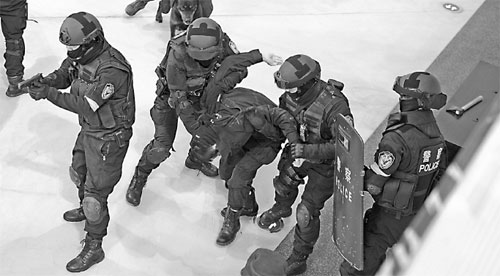Anti-terrorism law in works
|
Police seize a simulated gangster during an emergency drill in Urumqi, Xinjiang Uygur autonomous region, earlier this month. The scenario involved a female audience member at a sports event who was kidnapped by two gangsters with knives. Ma Yuan / for China Daily |
Measure addresses wide range of security needs
China's top legislature is considering China's first anti-terrorism law, which many say is urgently needed as the fight against terrorists has intensified.
A draft of the proposed law was submitted to the National People's Congress Standing Committee for its third reading on Monday.
It sums up the country's previous experience in anti-terror work and draws on the practices of other countries, according to lawmakers, who said the proposed law should be put forward for approval, as it is relatively mature. It is likely to be passed on Sunday, at the end of the committee session.
The proposed law aims to improve intelligence gathering and the sharing of information across government bodies, as well as the military, armed police and militia, as well as to enhance international cooperation, said Lang Sheng, deputy head of the committee's Legislative Affairs Commission, after the draft was first submitted to lawmakers in December last year.
The NPC started to draft the law in April last year - the same month that President Xi Jinping visited the Xinjiang Uygur autonomous region, which has become a major battlefield in China's fight against terrorism. After the visit, Xi spoke of the importance of having a national anti-terror law.
To improve China's overall ability to combat terrorism and cope with changes and trends at home and abroad, top anti-terrorism authorities held a series of meetings in December to lay out new guidelines. The Ministry of Public Security appointed its first-ever commissioner of counterterrorism on Sunday.
China attaches great importance to fighting terrorism online, as an increasing number of domestic attacks were plotted overseas and planned over the Internet, security chief Meng Jianzhu said on December 10 during an anti-terrorism work conference.
Minister of Public Security Guo Shengkun, who heads the national anti-terrorism leading group, said on Thursday at another conference that the crackdown on terrorist activities will be intensified, especially in preventing the spread of audios and videos online, and in stopping terrorists from getting in and out of the country.
Meng said China will also step up its efforts to prevent the spread of terrorist information via instant messaging services.
The draft law prescribes measures for Internet security management. An article in the first draft required Internet and telecommunication services to build "backdoors" to allow government surveillance. However, that was amended to stipulate "a strict approval procedure".
The draft also covers the examination of transport, dangerous materials, terrorism financing and border controls. Because of a lack of systematic laws in the field, the country's anti-terrorism work is incomplete, with measures not as forceful as they should be, legislative affairs official Lang said.
Contact the writers at cuijia@chinadaily.com.cn



















